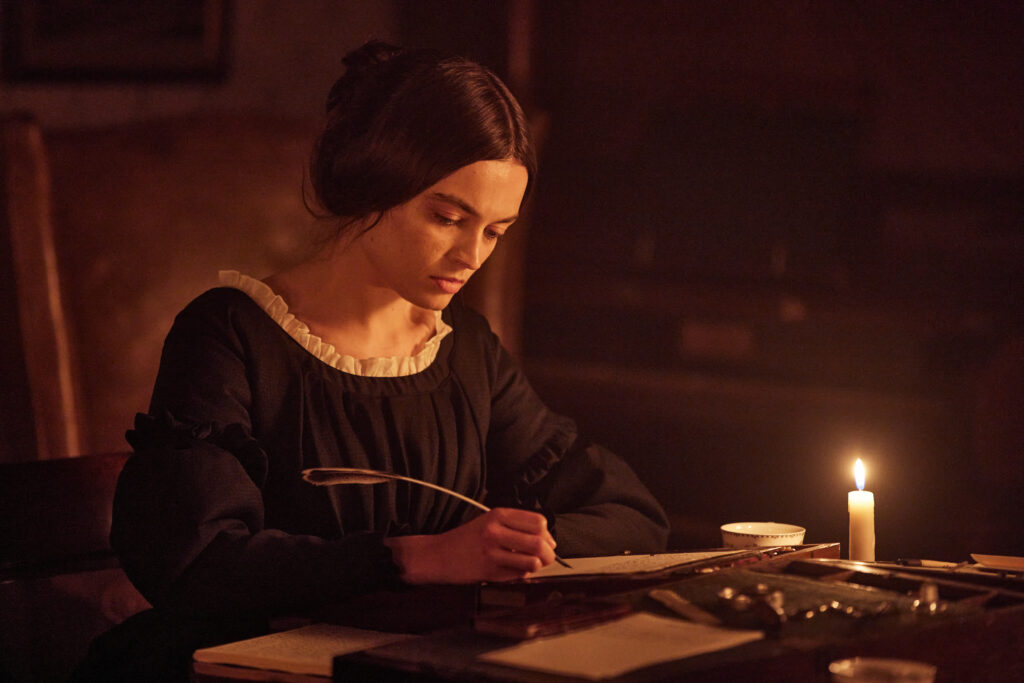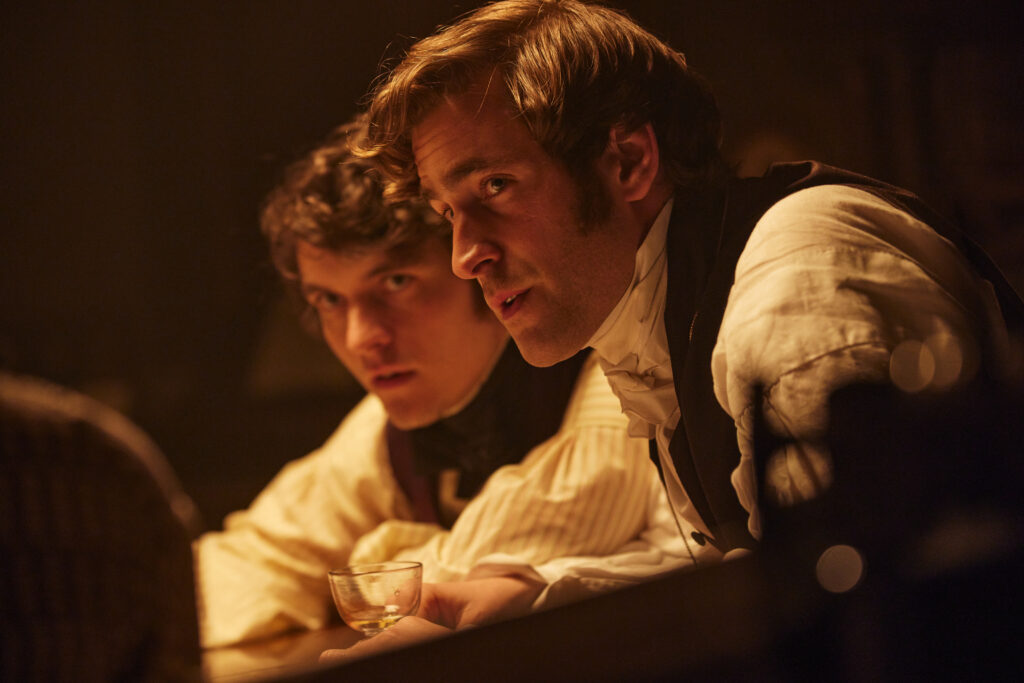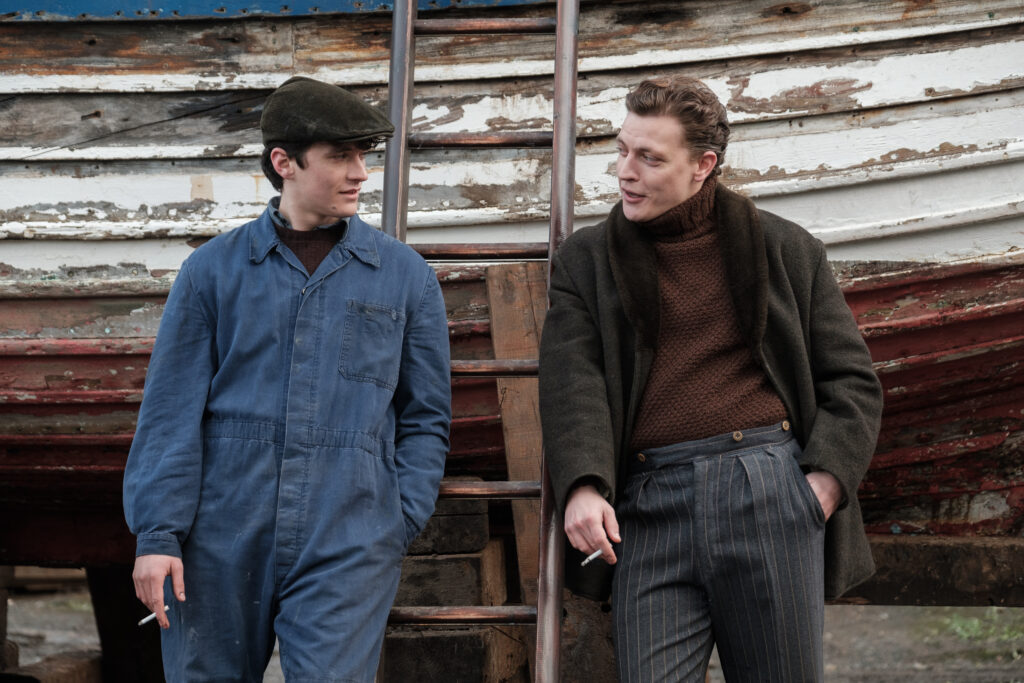February 19, 2023
by Carla Hay

Directed by Frances O’Connor
Some language in French with subtitles
Culture Representation: Taking place in England (and briefly in Belgium), from 1841 to 1848, the dramatic film “Emily” features an all-white cast of characters representing the working-class and the middle-class.
Culture Clash: Aspiring writer Emily Brontë, who is perceived as a reclusive weirdo in her community, experiences love and loss before writing her first and only novel, “Wuthering Heights.”
Culture Audience: “Emily” will appeal primarily to people who are fans of Emily Brontë, British films that take place in the 1800s, and well-acted movies that have gothic tones and themes.

Gorgeously filmed like an Emily Brontë novel come to life, “Emily” overcomes its occasionally dull moments with very good acting, led by a vibrant performance from Emma Mackey. This gothic drama perfectly captures the moody and eccentric personality of its author protagonist without turning her into a parody or caricature. It’s not a completely accurate biopic in the purist sense of the word, because much of the story is about a romance that was fabricated for the movie.
“Emily” is the first feature film from writer/director Frances O’Connor (also known for being an actress), who shows talent in casting choices, visual style and character development. However, “Emily” needed some improvement in the narrative structure: Some scenes look unnecessary because they don’t really go anywhere. Better choices could also have been made in the film editing for “Emily,” because the movie’s pacing sometimes drags. These are minor flaws that shouldn’t take away from the overall enjoyment of the movie.
“Emily” had its world premiere at the 2022 Toronto International Film Festival. For the 2023 British Independent Film Awards, the movie was nominated for four prizes: Best Lead Performance (for Mackey); Best Supporting Performance (for Fionn Whitehead); the Douglas Hickox Award, a prize given to a debut director (for O’Connor); and Best Ensemble. At the 2023 British Academy Film Awards, Mackey won the Rising Star Award.
“Emily” takes place mostly in England’s Yorkshire county, from 1841 to 1848. In 1841, Emily Brontë (played by Mackey) is a 23-year-old bachelorette who is shy, eccentric and reclusive. She has a vivid imagination and often seems to live in a fantasy world, but this personality trait also caused her to have a reputation in the community for being weird and an extreme daydreamer. Emily often talks out loud to the characters that she has created in her head.
She is also a poet who has been able to get her poems published under the alias Ellis Bell. It was very common for women writers at the time to send their work to publishers by using a man’s name as an alias, because they knew this gender switch would increase their chances of getting published. Unlike many women in her age group, Emily is not preoccupied with finding a husband, especially a man who has more money than her family does.
Emily lives in a rural parsonage in Haworth, England, with her widowed father Reverend Patrick Brontë (played by Adrian Dunbar), her younger sister Anne Brontë (played by Amelia Gething), her older brother Branwell Brontë (played by Whitehead) and her aunt Elizabeth Branwell (played by Gemma Jones), who is the sister of Emily’s deceased mother Maria. Emily has an older sister named Charlotte Brontë (played by Alexandra Dowling), who doesn’t live at home for most of the movie because Charlotte is away at college and then gets a teaching position at the school after she graduates.
All four of the Brontë siblings are aspiring writers, but the movie depicts Emily as the sibling who is the most consistently prolific. When Charlotte comes home for a visit from school, Charlotte mentions to Emily that she’s been too busy to write because of all of her schoolwork. Throughout the movie, there’s an unspoken rivalry between Emily and Charlotte—not just when it comes to any of their professional aspirations but also when it comes to their love lives. As the oldest of the four siblings, overachieving Charlotte expects to be the first of her siblings to accomplish great things and to be the sibling to get married first.
The Brontë family is grieving over the death of matriarch Maria, who died of cancer in 1821, when Emily was 3 years old. Maria’s absence has left a void that the siblings don’t really like to talk about with each other. What “Emily” doesn’t mention is that in real life, the family’s two eldest siblings (Maria and Elizabeth) died in 1824 from typhoid epidemic that plagued their school. Charlotte then became the eldest living sibling, which partially explains why she acts like both a sister and a mother to her younger siblings.
Emily is close to all of her living siblings, but she has a special bond with Branwell, who is only a year older than Emily. Branwell is fun-loving, rebellious and can usually make Emily laugh when she’s feeling depressed, which is apparently quite often. Unlike Charlotte, who is often judgmental of Emily and scolds Emily for being vulgar, Branwell accepts Emily for exactly who she is. He also has great admiration for her as a writer. And so does Anne, who is the kindest and friendliest of the four siblings.
Emily frequently joins Branwell for some of his mischief making, such as when they peek though neighbors’ windows unbeknownst to the neighbors, or when they indulge in taking drugs. Emily and Branwell secretly smoke marijuana together and take liquid opium stolen from their father, who keeps am opium stash for emergency medicinal purposes. This opium taking becomes a serious addiction for one of these siblings.
Whatever social life that Emily has is usually because of her more outgoing siblings. They sometimes frolic together in the nearby fields like giddy children. Things are much more serious at the church where their father is the chief clergyman.
However, the arrival of a curate named William Weightman (played by Oliver Jackson-Cohen), bachelor in his 30s, indicates that this church is about to undergo a transformation. William’s first sermon isn’t a typical stuffy lecture but is instead a personal tale with a rain theme. He talks about much he enjoys walking in the rain, and how rain is similar to a spiritual cleansing.
After the sermon, sisters Charlotte, Emily and Anne are gathered in the kitchen, where they are helping prepare meals for the visiting congregation. Charlotte and Anne are immensely charmed by handsome newcomer William, while Emily is not as impressed. And it’s at that moment that you know what Emily is going to fall in love with William.
Anne gushes, “He speaks with such poetry.” Emily replies, “Any man can speak, but what can he actually do?” Emily then says sarcastically, “I do wonder though: How does God squeeze Himself into all that rain. Does he get wet?”
At that moment, William walks in the kitchen to formally introduce himself. He knows that the sisters were talking about him, and there’s some awkwardness that he quickly diffuses with self-deprecating charisma. Emily doesn’t say much to William in this conversation, but her staring eyes show that she’s intrigued by him but doesn’t want to admit it to anyone just yet.
Over time, Charlotte and Anne openly express that they have a crush on William, as they giggle in his presence and seem awed by everything he says and does. For Valentine’s Day, William gives all three sisters friendly Valentine’s Day notes, but Emily is the only one of the sisters who reacts with seeming indifference. However, through a series of circumstances, (including William becoming Emily’s French tutor), Emily and William get to know each other better. And an attraction grows between them.
Up until this point, Branwell is the man who is closest to Emily. Branwell is aware of a growing attraction between Emily and William. Branwell seems jealous or threatened that another person could mean more to Emily than Branwell. And so, Branwell tells Emily that he doesn’t think William is the right person for her. William is cautious about having a love affair with Emily because it’s ethically questionable and because he doesn’t want to lose the trust of Emily’s father, who is William’s mentor.
Like any compelling gothic movie that mixes horror and romance, “Emily” has a few scenes that are literally haunting. One evening, the Brontë family is hosting a dinner, with William and a family friend in her 20s named Ellen Nussey (played by Sacha Parkinson) as the guests. Patrick brings out a white theater mask that he says was a wedding gift to him and Maria, but this gift was not accompanied by a card, so they never found out who gave them this mask. Patrick explains that his children would play with the mask when they were growing up, by someone putting on the mask and playing a character, while other people would have to guess the identity of the character.
After dinner, Emily, Charlotte, Anne, Branwell, William and Ellen gather in a room to play this game from the Brontë siblings’ childhood. At first, the game is lighthearted. But then, Emily puts on the mask and starts talking. To her siblings’ horror, they figure out that Emily is impersonating their dead mother. Suddenly, strong wind gusts whip through the room, as if an unseen ghostly spirit has appeared. People in the room have various reactions, but it unnerves most of the people who witnessed this spectacle.
“Emily” doesn’t turn into a ghost story, but the mask is a symbol for how much of the past the siblings want to hold on to, when it comes to their childhoods and how the death of their mother has affected them. At one point, one of the siblings buries the mask in the backyard, as if the mask also represents painful memories. The mask is later dug up and retrieved, as if to reclaim those memories to being positive and something that shouldn’t be feared.
The romance between Emily and William plays out exactly like it usually does in movies like “Emily,” with Mackey and Jackson-Cohen showing the typical combination of repressed lust and unleashed passion, depending on the scene. Mackey does a lot of terrific acting with her expressive eyes, so that observant viewers can deduce what Emily is thinking, even when Emily isn’t saying a word. The movie shows that, far from being bashful about expressing love, Emily is the one who initiates many of the overtures in this romance.
Whitehead also stands out in his role of complicated Branwell, who seems to be carefree on the outside, but Branwell is actually deeply insecure and troubled about himself and his place in the family. Whereas Emily has Charlotte as Emily’s biggest critic, Branwell has his father Patrick has Branwell’s biggest critic. Branwell can’t seem to change Patrick’s perception that Branwell is a “disappointment” to the family.
Because very little is known about the real Emily Brontë’s love life, the romance in the movie was created to spice up the story. Although the character of William is a composite of real people, according to the production notes for “Emily,” there is no evidence that Emily fell in love with someone who worked for her father. However, the movie correctly depicts that Emily briefly gave up writing when she decided to become a teacher.
The sibling rivalry between Emily and Charlotte is much more plausible. In real life, Charlotte Brontë also became a famous author because of her novel “Jane Eyre,” which was published in 1847, the same year that Emily Brontë’s “Wuthering Heights” was published. Both novels are centered on romance, but each book has a very different tone. “Wuthering Heights” has a darker tone that was considered more risqué at the time.
Because “Emily” is told from Emily’s perspective, very little is shown about Charlotte’s writing process. “Emily” speculates what could have motivated Emily to write her greatest and best-known work (“Wuthering Heights”) in her short life. The movie is both a fitting tribute and an imaginative portait of an enigmatic author whose work has stood the test of time.
Bleecker Street released “Emily” in select U.S. cinemas on February 17, 2023, with an expansion to more U.S. cinemas on February 24, 2023. The movie was released in the United Kindgom on October 14, 2022.






